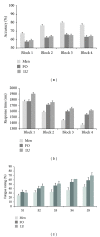Progesterone and mental rotation task: is there any effect?
- PMID: 24818150
- PMCID: PMC4004113
- DOI: 10.1155/2014/741758
Progesterone and mental rotation task: is there any effect?
Abstract
Mental rotation task (MRT) incorporates elements of spatial abilities, important in many professions, with people of both genders involved. Importantly, these are the areas where spatial tasks might be performed for long time periods; thus adverse effects of mental fatigue are highly unwanted. Substantial variation of MRT performance in relation to estrogen levels has been observed in many studies, whereas the role of progesterone remains elusive. Here we aimed to elucidate the effect of progesterone level on the long-duration (1.5 hours) performance of MRT. We included three groups of subjects: a group of males as a control, a group of females in their follicular phase (low progesterone) and a group of females in their luteal phase (high progesterone), MRT accuracy and response time, subjective fatigue ratings and cardiovascular measures together with 17 β -estradiol and progesterone concentrations were analyzed. We found that subjective ratings of fatigue increased, performance accuracy increased, and mean response times decreased during the task in all groups. Females in luteal phase were significantly slower not only than men, but also than females in their follicular phase. An increase in subjective fatigue ratings was positively related to progesterone level-at higher progesterone levels, females felt more tired.
Figures


References
-
- Shepard RN, Metzler J. Mental rotation of three-dimensional objects. Science. 1971;171(3972):701–703. - PubMed
-
- Courvoisier DS, Renaud O, Geiser C, Paschke K, Gaudy K, Jordan K. Sex hormones and mental rotation: an intensive longitudinal investigation. Hormones and Behavior. 2013;63(2):345–351. - PubMed
-
- Linn MC, Petersen AC. Emergence and characterization of sex differences in spatial ability: a meta-analysis. Child Development. 1985;56(6):1479–1498. - PubMed
-
- Miller DI, Halpern DF. The new science of cognitive sex differences. Trends in Cognitive Sciences. 2013;18(1):37–45. - PubMed
Publication types
MeSH terms
Substances
LinkOut - more resources
Full Text Sources
Other Literature Sources

